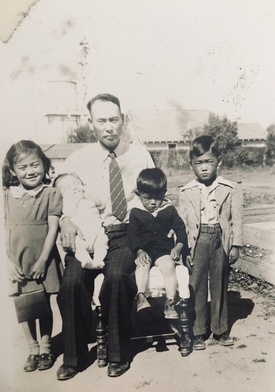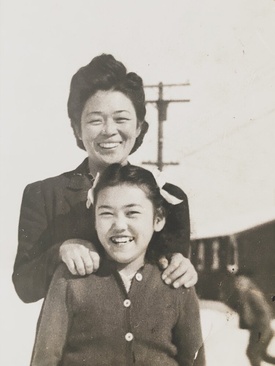When Pearl Harbor happened, do you remember that day?

What happened to me, I don’t recall that day at all. I think it was because we were on a farm, we didn’t even know it was being bombed, probably. But my father knew about it because the menfolk talked. But we didn’t talk about it and to me, it didn’t register anything. I didn’t know what war was or anything.
What do you recall about the government officials who came to talk to your father?
I remember they had badges and they just looked different. I remember just peeking, but I didn’t know what it was about. And all I knew is Papa said we have to do this and I knew that it was the war.
When were you finally forced to move from your home?
It was in April 1942, and we were bused to the Salinas Rodeo grounds which was converted to an assembly center. I remember following close to my parents at all times. I have never seen so many people with faces of apprehension. Nobody was smiling, it was just confusion, and I remember that. I don’t have any visuals of our facility — I think I blocked it out of my memory. But I know that some people had to sleep on mattresses made out of straw. And it had a very foul smell because it was the Rodeo grounds. So I think it was something I did not want to remember.
On July 4th, we were on a train with covered windows for a long ride to Arizona. I remember among all the Japanese, there were American soldiers riding along with us. But I think they were being transferred to another location, not as military watchmen of us as they were young and friendly. I remember that because we had suitcases that were under the seat, and our Big Ben alarm clock went off and it made really a loud noise and people were smirking and kind of laughing, but you know, Japanese are very reserved. But those fellows were saying, “Hey, time to wake up,” or something like that, trying to converse with me. They were facing us and we were facing them, that’s how I remember it.
I’ve never heard of outside soldiers sharing a train with the Japanese Americans.
They were very young, and very friendly. When we arrived in Poston, they were having the worst dust storm in decades. It was hot and miserable and you could not see, and the blowing sand hurt my face. I remember my mother and I visited the bathroom and she had fainted. Nothing like that had ever happened before so I thought she had died. That was traumatic, other women went to her aide and other women tried to console me. I remember crying so hard. My youngest brother was just a year old and she was still nursing him and I’m sure she was exhausted. That experience remains firm in my memory.
Poston was a large camp and we lived in barracks that housed four families. Each family had one room which was divided into sleeping areas by hanging a sheet. The other side was for the living area with a table and chairs. But for a family of six, it was very small. Somehow we had beds and mattresses for sleeping. I don’t know if the government provided them or not. I imagine they did. Our parents found wood to make small furniture like cabinets to house our books and supplies. Poston did not have restrictive fencing surrounding the camp perimeter. People were allowed to wander to the Colorado River to fish or to look for driftwood and ironwood to make carvings. With patience and time, my father made a beautiful game board called go out of ironwood.
Almost every family had a cooler outside their window because of the intense heat. We learned to not walk barefooted to avoid stepping on scorpions, gila monsters or rattlesnakes. As a seven year old, I had fun as a brownie scout. One of our favorite pastimes was playing with marbles, digging up ant holes to make a target. The ants were red and larger and if bitten, it could hurt. We saw outdoor movies on certain nights and enjoyed going to the store to purchase small playthings with our parents. I think they called them canteens. They bought our clothes there and sometimes ordered them through mail order catalogs, also. We attended school daily and life was fine. I remember there was a family of four fellows who were young adults or in late teens as one of them used to tease me and chase me around a lot. That was probably the only negative about Poston. It was just teasing but I didn’t like that, it was uncomfortable.
But being there not quite a year, discussions arose within our relatives about one’s loyalty to the U.S. government or to Japan. Each adult had to decide where his or her allegiance stood. The U.S. government had a form that required answers. My aunt and one uncle were Japan loyalists and my mother bordered on it too, but not my father. However, there was consideration of my brother’s burned arm that required additional surgery and it was said that Tule Lake camp had a larger hospital and would be able to conduct this involved surgery for my brother’s fingers. My aunt and uncle left for Japan and we were transferred to Tule Lake, California very close to the Oregon border.
Mom, she signed no/no so she had to regain her citizenship again. And my father, I don’t know about him. I just wonder if someone could just tag along and say “yes.” I don’t know that, isn’t that awful? I don’t know that. But he wasn’t wanting to, he said “That’s not the place to go. That’s a small country.” I remember seeing how everybody was overwhelmingly one-sided and Pop was quietly saying that’s just not the place to go. But that was all I remember. And that was before we went into Tule.
Your father was working so hard to create this life in the United States and he just wanted to build a foundation.
Right and to create a family and happiness here. And it was a struggle because once he got to that point where we could live in that little house that they built, everything was happy. He was secure with his job, they liked him and he used to do tractor work and things like that, and then this war happens, and they’re taken from their comfort.
And I often wonder how they managed to pay for the goods. I wonder if they sent cash to Spiegel’s. He used to order from Chicago Spiegel’s in Tule Lake because we were all growing, and outgrowing our shoes. And I wondered how he paid for it, that was one of the questions I always wondered. So he had to be on his toes all the time. I remember he bought us galoshes, and I remember getting them and I says, “Did you get this for us?” And he says, “We ordered it and the size is big so just stuff them with newspaper at the top.” We used to stuff them and it was a little bigger so we could wear it for a couple of years. So I think about all those things he had to decide.
So there were many contrasts between the two camps. The weather, the people, military prevalence, a quiet concern for ourselves, a sense of insecurity, and tall fencing surrounded the camp with military men with guns in watchtowers located everywhere. For me, it was this aggressive tight band of men running each morning shouting “wasshoi wasshoi,” a form of exercise that I found scary and I use to run away when they were approaching. They wore white bands tied on their head and many bare chested without shirt tops. People didn’t have the freedom to go distant and were unable to leave without written permission. Tule Lake was the largest camp and security was tight.
In the winter it snowed a lot. Like Poston, there were barracks lined on two sides with the bathrooms and showers building in the middle, along with an ironing and laundry building. That was called a block so we lived in Block 20. I remember we had a chamber pot because walking in the snow at night to visit the bathroom was difficult and required a parent. But as children do, their play takes them to hidden places and the boys found the place where potatoes were kept in bulk. It was below the ironing room floor. It made for a perfect place to keep potatoes cool. In the summer we would sneak a few potatoes and throw them in a fire we made in a sunken pit to cook. Trick was to get them out without burning our hands. But they were so good to eat with a spoon after peeling off the scorched skin. We attended Japanese school in the afternoon after our morning English school. The Japanese school was very strict and the teacher readily used the ruler to keep the class in order and quiet. Both of my parents worked to earn $16 a month — mother worked in the kitchen and I don’t remember what my father did but I think he worked with storage because he used to carry boxes back and forth.
But because they were not around, I didn’t eat well and developed nephritis, a kidney problem that required me to remain bedridden for nine months in the hospital. I missed the fun but enjoyed drawing and sketching when the thoughtful nurses brought me tablets. My brother had his surgery, too. I didn’t know the details except that his fingers and hands work fine but his arms are bent slightly and scarred to this day.
*This article was originally published on Tessaku on December 25, 2020.
© 2020 Emiko Tsuchida







